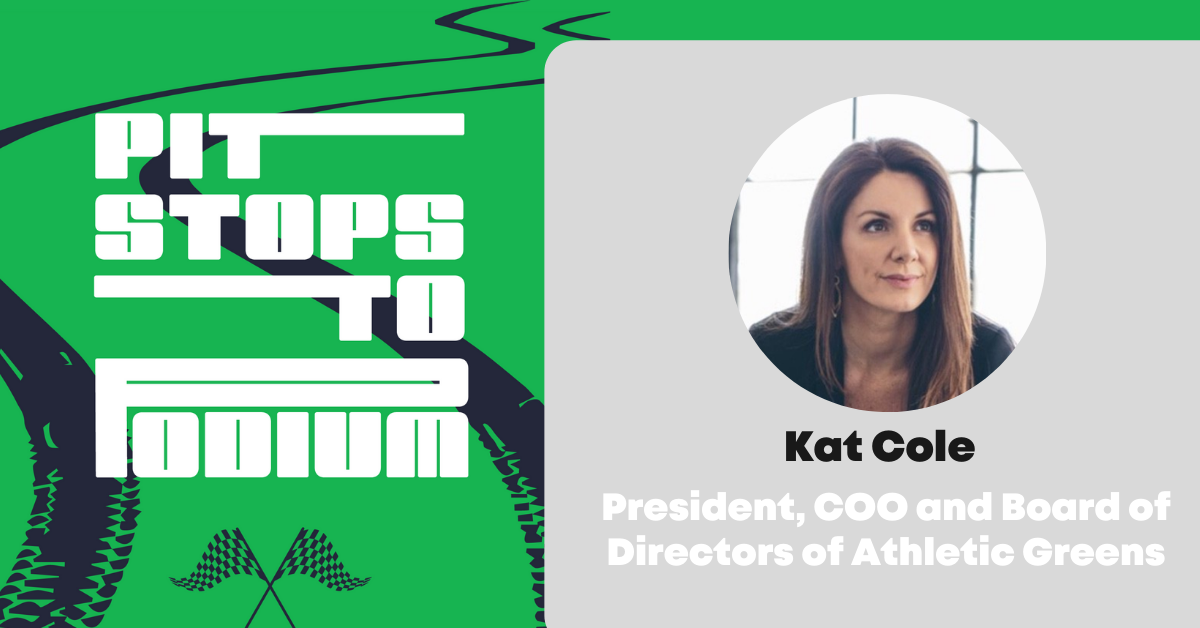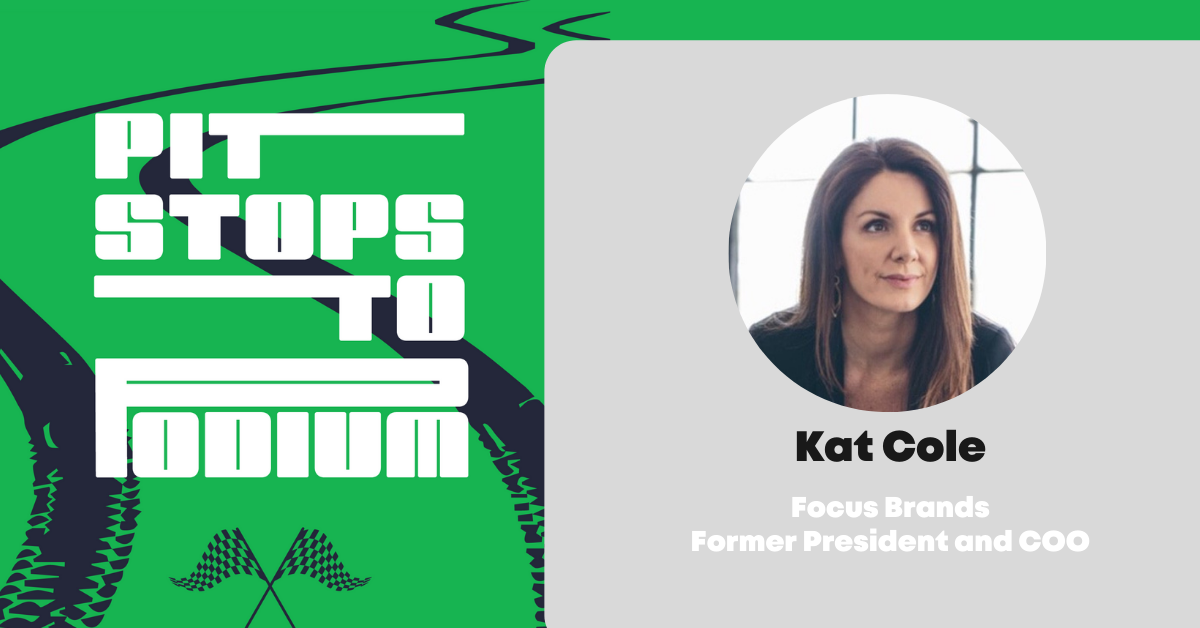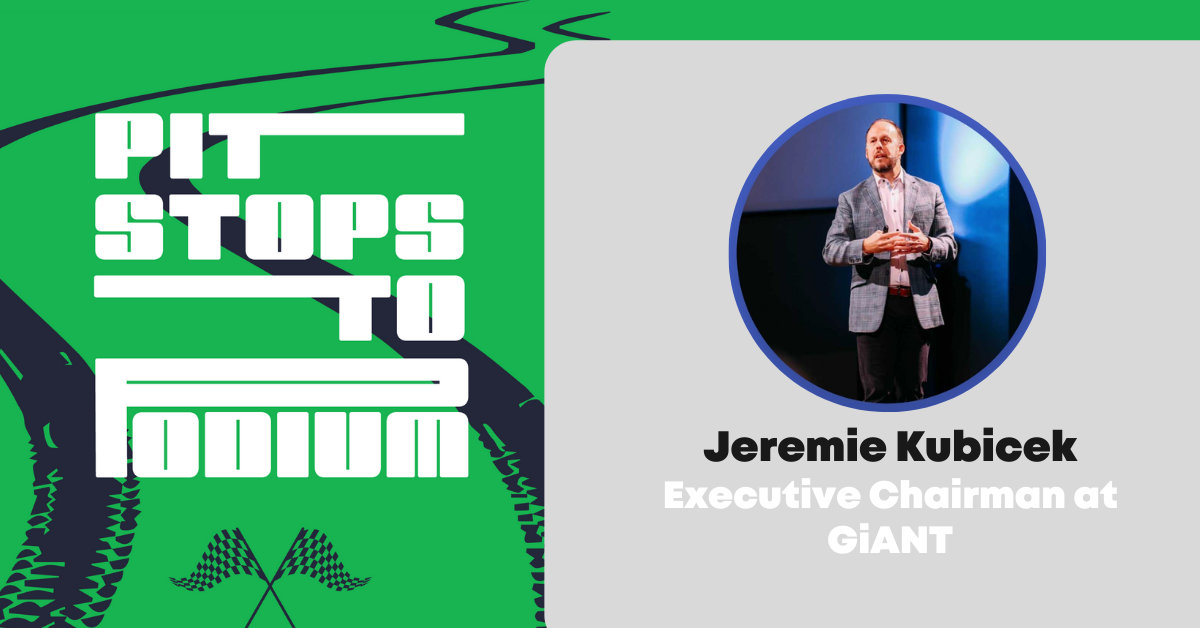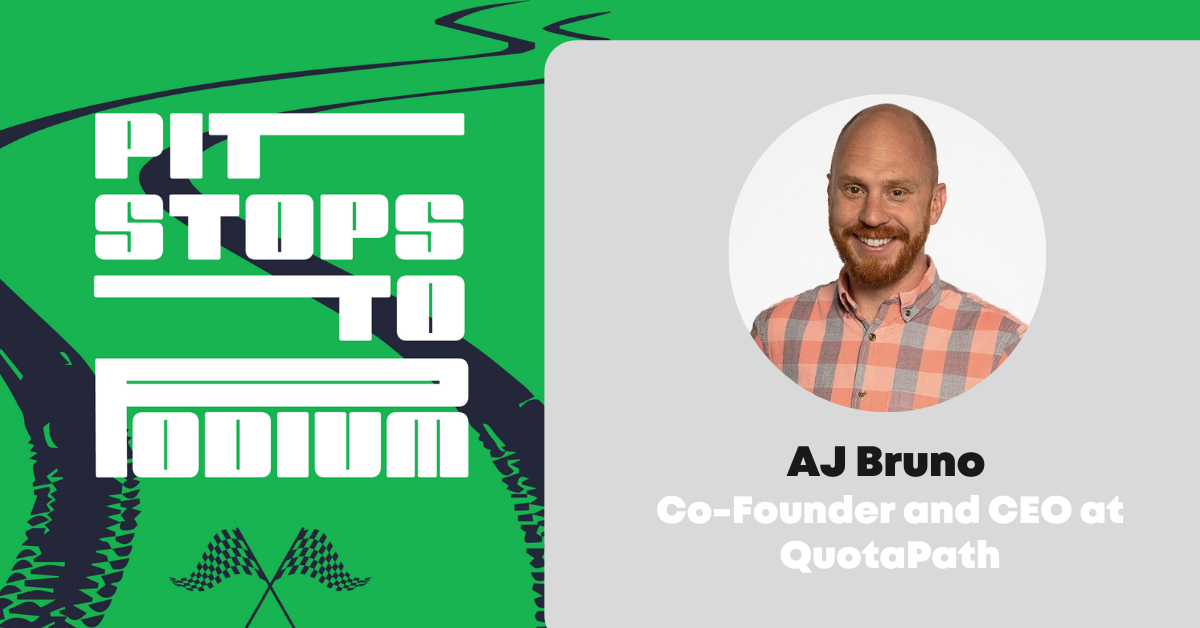Table of Contents
In this episode of the B2B podcast, Pit Stops to Podium, Kat Cole speaks to the B2C leaders to give specific insight into what it takes to build a winning brand. She categorizes indicators of a healthy brand into 2 main buckets - relevance & differentiation. "Being high on both is a mark of a brand that lasts and is winning at any point in time.”
Kat Cole served as the President and COO of Focus Brands for 10 years and now helps other people build their businesses. She serves on the board of Human Co SPAC; Slice, a tech company for pizza entrepreneurs; Milk Bar, the omnichannel deserts and sweets company founded by Christina Tossi; advises early and growth-stage companies in the consumer space or SMB tech space; is an angel investor in over 50 companies. In addition to all these contributions to the business and tech space, Kat also has been involved for 10 years in humanitarian work in Eastern Africa.
Pitstop Highlights
What is a Brand?
“A brand is simply a promise that a company makes to its customers and employees, to its stakeholders, essentially, and that promise is built by both what the company communicates, what it says, and of course, what it does and how those stakeholders experience that company over time”
Brand Relevance
Relevance is essentially something that matters in a customer's life today. How does the company fit into the customer's daily life in terms of hours, minutes, and days?
A factor that may fall under relevance can be pricing. If a brand is not affordable to a customer, it won’t be relevant to them. That doesn’t mean that they don’t think positively about the brand, it is simply because it is not in their relevant price range.
Brand positioning and voice have a major influence on a brand’s relevance. Companies may ask themselves “What is our position on social causes? How do we feel about the planet and wellness?”
Some highly relevant brands include companies like Amazon, Daily Harvest, Apple, and Tesla.
Brand Differentiation
Brand differentiation deals with its uniqueness in terms of its reputation and perception in the eyes of the consumer. Essentially, it's the means by which a brand is set apart from its competitors.
Many brands have maintained relevance but have struggled with differentiation whether through loss of innovation or failing to meet the market expectations of their consumers. It’s important to note that differentiation isn’t static. Companies constantly change and evolve as they adapt to the marketplace.
"Just because you once were is no guarantee that you are today, nor is it a guarantee that you will be tomorrow”
Connect with Kat:
- Website: https://katcole.substack.com/
- Linkedin: https://www.linkedin.com/in/katcole/
- Twitter @KatColeATL
Full Transcript:
Brendan: Hey everybody, welcome to Pit Stops to Podium. The RevPartners podcast, where we talk to execs who compete and won in taking their companies from high growth to high scale. My name is Brendan Tolleson and I am the co-founder and CEO of RevPartners. I'm delighted to have with me today, Kat Cole, for this edition of Pit Stops to Podium. Welcome, Kat.
Kat: Thanks for having me.
Brendan: Absolutely well, for those who don't know who she is currently serves on the board of multiple companies, which I'll let her introduce in just a second, but also had quite a run as president and CEO of Focus Brands. How would you give our audience a little bit of perspective on who focuses and ultimately some of the companies that you currently serve today?
Kat: Yeah so I'll start today and then go back. So today I'm on the board of Human co., which is a SPAC. So Human CO SPAC, a SPAC publicly traded on the NASDAQ that is looking to take a large wellness company public. So it's a wellness SPAC. I'm on the board of Slice, which is the pizza technology company, so it is both a marketplace for pizza wherever you are. If you want to order pizza, download, Slice and order pizza. But it's also a technology company for pizza entrepreneurs, and so they do websites and mobile ordering and aggregation and insights and marketing. And so they're kind of end-to-end marketing solution that allows independent pizzerias. Believe it or not, that industry alone is big enough to support such a company. And I get to work alongside amazing world-class investors who have invested in that company. That's at a growth stage company. They process this year will be about a billion and GMV. Then I'm on the board of milk bar, the omnichannel desserts and sweets company founded by Chef Christina Tosi. So those are my formal boards, and then I advise a ton of both early and growth stage companies that are either in the consumer space or the SMB small business technology space. And so those are my boards and advisory roles. I'm an angel investor and about over 50 companies, many of them early stage, most of them consumer or health, tech and Ed tech. And previously I was with Focus Brands who focus is the franchisor licensor and operator of eight brands around the world like Jamba Juice and cinnabon, 70 countries, 7,000 plus locations, 100,000 points of retail distribution. So that's outside of our franchise business, and I was with that company for 10 years, starting as president of Cinnabon. Turning that around in the recession, helping to build that company and brand, then building the omnichannel e-commerce CPG and manufacturing division for the company, which took all the brands to channels other than franchising. So I was group president of the parent company building that division, and then I became CEO and President of the parent company, running all the brands around the world four years ago. So filled that role for four years and then just wrapped up that 10 year career at Focus Brands in January of this year and am focusing on the things I mentioned prior board advisory, finishing my book, writing a newsletter like getting all my lessons out there, but really helping other people build their businesses
Brendan: Well before we get into our big idea, and it was hard to figure out which one we want to talk about in light of your experience that you just outlined, we have a tradition here at this at Pit Stops to Podium, and that's to get to know our guests outside of work. So Kat, outside of all the things that you just outlined, what are three things that our audience should know about you? I got married at Burning Man. I have done humanitarian work in Eastern Africa for over a decade. It's a big part of my life and culture and being, and I have two babies becoming less babies every day. They are 4 and 2. Ocean is the oldest, and Arrow is the two-year-old.
Brendan: Certainly a sweet season. What's the tie to East Africa for you?
Kat: I just started doing work in Rwanda. A friend invited me there and I fell in love with the country and started doing work in the region. Everything from women's mentorship to technology company advisory and mentorship, to conflict zone work on the Ethiopian and Somali border. And so my work over time has just been very organic, started as a single kind of love project in Rwanda, and then, because I was comfortable in the region, kept getting called back by different groups and different countries for different things over time. And I'm a coffee freak and it is the cradle. Ethiopia is the only place in the world from which coffee is indigenous, so it's got a many special places in my heart.
Brendan: Well, we’ll have to have another podcast about that other time. That's a passion of mine, and I've spent some time in as well. Well, let's transition to. The big idea, so you talked a little about your experience, both at focus brands, in terms of building that company as well as on the work you're doing today. And I think you'd be one of the leading experts as it relates to how to build a brand. And so we're talking about a few different things as it relates to how you define it. But let's dive in first into the definition and we'll talk about a few different areas in terms of a framework, if you will, for how to think about how to build a brand for a high growth company. So in your mind, how do you define what a brand is?
Kat: I mean, a brand is simply a promise that a company makes to its customers and employees, to its stakeholders, essentially, and that promise is built by both what the company communicates, what it says and of course, what it does and how those stakeholders experience that company over time. But at the end of the day, it is the promise and the perception of the promise as defined by the customer over time, not necessarily by the company. So it's just what people think a company is promising them and delivering and how that promise comes to life.
Brendan: I love that it's a great way to capture what a brand is. And so let's talk a little bit about these three anchor points. We have relevance, differentiation and an evolution of that over time. So let's start with relevance, and you may intertwine that with differentiation in terms that 2 by two, because I think it's a really neat framework of thinking about brand.
Kat: Yeah, it was, you know, it took a lot of mistakes and lessons over time to realize, you know, after running many brands around the world, I was with Hooters restaurants for 15 years, even before Focus Brands and then Focus Brands being a multi brand portfolio and a multichannel. You know, it's both a house of brands and then some of those brands themselves are branded houses, so they have many different versions of the brand underneath the brand. And so when you're in that type of an ecosystem, you definitely learn a lot about brands and what they can do, what they can't do, where they have permission to travel. And over time, it was clear to me that the things that really allowed a brand to be healthy over time would all fall into relevance and differentiation. And I will go to battle to anyone who says there is such a thing as a third bucket because I can pretty strongly argue that things go into one or the other. And so relevance and differentiation being high on both is a mark of a brand that lasts and a brand typically that's winning in the marketplace at any given point in time. And so to park on the first piece. Relevance essentially, it's simply that it matters in my life as a customer today. Um, it is something that matters in my life today, today, as in this moment, this minute, this hour, this day, things move so quickly and a brand can be relevant last year and not this year can be irrelevant now and then become relevant over time. So the good news is all hope is not lost if you're low on the relevant scale. And so things that fall under relevance are things such as pricing, right? If I can't afford your brand, it's not relevant to me. Does it mean it's not something I like that it's not aspirational, but it is not relevant to me. So price is a big part of relevance. Brand affiliation and aspiration has a lot to do. Brand positioning and voice has a lot to do with how relevant it is. Where am I on the scale on the continuum of social causes? How do I feel about the planet or wellness? Am I leaning into pop culture into something need to really be a part of the moment of iconic pop culture moments to be relevant to me? So positioning and affiliations and aspirations sit firmly in the bucket of relevance. There are many other things that fit into relevance, like portion size, access, right? Convenience convenience is a big part of relevance today. So is this a thing that I need and want to get quickly? And if so, how quickly can I get it from you? And convenience is broken into two parts points of access. So how many places can I get it and speed? There separate. But obviously they're related. If you have more points of distribution, more points of access, whether they're delivered by a third party or it's a store around the corner or it's online or it's a marketplace, then that has something to do with speed. But it doesn't guarantee speed enough. Speed is a path of convenience in and of itself. So if you think of convenience, we're in the convenience economy. We're also in the experience economy. But that's going to fit a bit more cleanly and differentiation when we get to it. The convenience economy is about access locations either physical or virtual, and how fast can I get it? So there are many pieces of relevance, but certainly today, and especially in food and other types of consumer products, the convenience economy has just continued to grow in importance in most people's lives. And then a brand has to decide how easy do I want to be defined? How many places do I want my product or service marketed, sold and transaction or interacted with? And that's a brand choice. There are positives and negatives of any of those choices. And then speed, you know, how quick can I be? And in some businesses, speed can come at the cost of quality. And so you have to make these decisions and trade offs, not always, but often you have to make these decisions and trade offs to decide how relevant am I and people's lives today?
Brendan: Yeah, I like the concept of access and speed. Is there any, I guess, either from your experience or just knowledge, from a professional experience, but also just as a consumer who's doing that well? Or maybe more importantly, who's not doing that well as you think about the relevance category?
Kat: Oh, I mean, it depends on how people want to think about brand, you know, brand can obviously be any company. So certainly a brand and a business like Amazon is, it's highly relevant in people's lives. So marketplaces that have grown to be important part of people's daily habit or weekly habit are highly relevant. Typically, those marketplaces have a lot of price choice. You know, you can go super cheap or super expensive. So price, other than the cost of delivery, which is often determined by the merchant at large. Although affected by the marketplace, those types of businesses are often highly relevant right now. In terms of brand like pure, pure consumer brand I think about a brand like Daily Harvest, right, that is leaning into both wellness and convenience and a bit more affordable on the wellness side of things. There there are brands like mud, water, senso, house of wise. I'm thinking of all the brands I'm involved in CBD brand that are easy to access, easy to find. I can get them. Their price point fits with what they're promising. Prima, the CBD cosmetics company. These are amazing brands. I mean, I could name the obvious ones like Apple and Tesla, but Tesla isn't relevant for everyone. Not everyone can afford a Tesla, but they have continued to move down market in their pricing. And so they're broadening the relevance. And then the more service stations, the more charging stations, right, the more that brand. Although it's through the roof on differentiation, there's some opportunity for it over time to continue to become more relevant to a larger group of people. And I think that's an important note that just because a relevant brand is relevant to some, it does not mean it's relevant to all. So when I speak to brands that are relevant, I'm thinking of decent sized populations that find it relevant at one time. A great example that I always give of a brand that was highly differentiated but not relevant over time was rolls-royce right now highly differentiated, unique signature look. You could see it without its logo and know what car it is. Most people couldn't afford it, and even over time, it didn't remain competitive with the other products that were in that aspirational, you know, in that aspirational tier. And so it lost relevance. It maintained differentiation, but it lost relevance. There are some brands that are highly relevant, but again, we're going to get to differentiation. They lose their differentiation. So they become commodities. And so it's a race to the bottom from a price perspective.
Brendan: I like that. Let's transition into differentiation. I like the Tesla example. So how are you defining differentiation for the audience? As it relates to brand?
Kat: Differentiation is pretty straightforward. It it has a unique flavor, reputation, perception in the mind of the consumer. It is simply distinction and uniqueness. It is different than these things around it. It's the Sesame Street song. One of these things is not like the other. And that's differentiation. And so, you know, again, there are so many brands that have maintained relevance but lost their differentiation either because they did innovate a lot in an attempt to keep up with the marketplace and then ended up being the same as everyone else flooding the market. Or they didn't change. Many other competitors came into their space and lost their differentiation in a reactive way. So you can sort of immobilize yourself for lots of reasons that seem like good ideas inside of a company and lose your differentiation that way. Or you can change yourself so much that you go run into crowded categories where you're one of the same. I mean, certainly it was a battle. We fought quite a bit in the Focus Brands portfolio with a brand that I love Moe's Southwest Grill and, you know, its burritos. And so Chipotle is the largest. Moe's was always number two, but the only one that was franchised and it was the only one. Still today that is so, so highly ranked by families. You walk in and say, welcome to Mo's. And so. Any effort to evolve that might diminish that family orientation would be an example that would lower its differentiation.
Brendan: I like that. Well, and then how does that as we think about relevance differentiation and we're talking about high growth to high scale? How does that, I don't say necessarily evolve, but how do you maintain or balance that tension in the midst of growth?
Kat: Yeah I mean, the reality is it is an activity, right? The brand isn't something that is static. Relevance and differentiation are not static. Just because you once were is no guarantee that you are today, nor is it a guarantee that you will be tomorrow. And so that in and of itself is a pretty massive body of understanding that is often missed even in high growth teams because they're so close to when they launch, they're so close to when they were successful. There's this belief that proximity to the origins means rocket ship trajectory or a gain curve up and to the right hockey stick. All those things, and it doesn't, especially with the world today, is as low as the barriers to entry are for almost any industry, not all but but many. And so this respect that it in fact does change and must evolve. So the things to think about as it relates to evolving the brand or one staying insanely close to your customer, asking them thoughtful questions that help you think about what you can stop doing, which means what you can stop saying things you can stop doing visually from a marketing perspective. And even, you know, the great rationalization of SKUs and services mean eventually some things need to be put to rest because it protects your differentiation over time or it enhances your relevance if you don't have this thing. So think about big cereal companies that started to drop the artificial flavors and sugar. Right? it's not only about what you start doing, it's about what you stop doing. And doing that by listening to the customer and staying insanely close and making sure that over the arc of time, whereas at the beginning, the brands promise is its first product. It is its first service. It is the founder story. Two years later, five years later, as the company is bigger, as it's defined more products, it's defined as kind of the cumulative set of interactions that customers have had with those products, those employees over time and how they view it in the competitive set. So someone having their finger on the pulse of how the brand feels and is perceived in the sea of the competitive markets and then how the customers need states and lives are changing? And whose lives do we want to be on the journey with and how do we evolve with them? And whose lives are we OK saying they're on a different journey than we are, and this is where our train stops for you. But because we're relevant, new people are getting on at this point.
Brendan: Yeah, well, I love it actually ties back to your definition of what the brand is in terms of having that connection to the customer. So I love that response because it keeps it back at the core. Well, kat, I really appreciate you making the time with us today. What is a practical way in which people can engage with you as a social platform that you use most, like Twitter, Linkedin? What's the next step for them?
Kat: Yeah, it's all the things. I mean, Twitter and Instagram. I'm Kat Cole ATL. Just straight up Kat Cole on LinkedIn. I have a newsletter on Substack called checking in. They could just look up my name on Substack. I hold courses and workshops on a lot of the startup platforms like Maven and bright, so there are many ways to get little snippets or just follow me or to engage more meaningfully perfect. Or if you're going to Burning man, that's right. Next time, maybe we'll see you there.
Brendan: Well, Thanks so much. Appreciate the time. We'll talk to you later.
Kat: All right, thanks.
Want to learn from more industry experts?
Come check out the full Pit Stops to Podium podcast repository!




